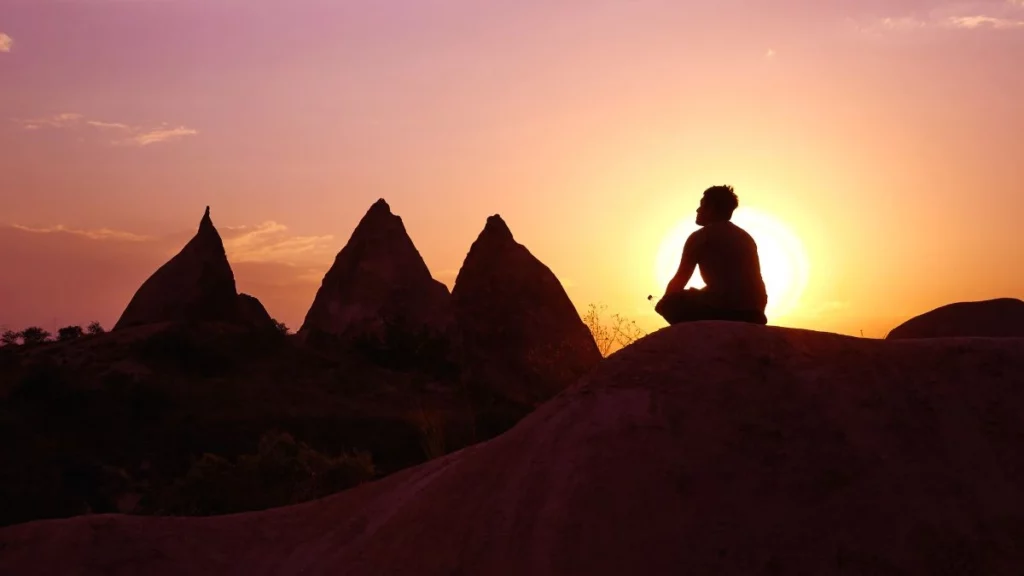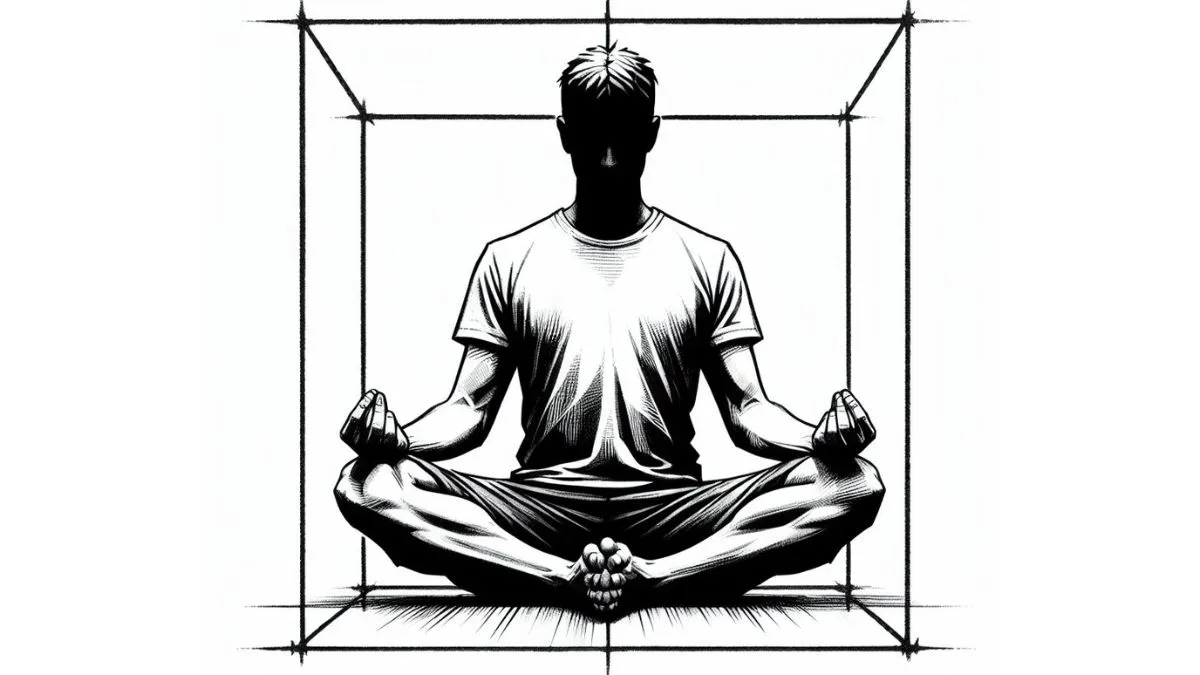Introduction
Are you a spiritual person? You may be kind, truthful, and nonviolent. You may not steal, cheat, or lie, or you may be chaste and not possessive. But do you know if you are a spiritual person? Probably not. Most people who have these qualities are not even aware of them. They are just living their lives the best way they know how. Are you curious about the spiritual path but don’t know where to start? Do you feel like there’s something more to life but don’t know what it is?
In this article, we will explore some signs that you may be a spiritual person. We will also discuss some signs that you are not aware of your spiritual nature. Read this article to know what spiritual awareness is.
What is a Spiritual Person?

A spiritual person is someone who has an inner drive towards finding a purpose and direction in life. Normally, people restrict themselves to limited circumstances. They dedicate their time to only one aspect, age, or surrounding at a time. Their beliefs change as time or circumstances change. Whereas a spiritual person thinks holistically. They do not bind themselves or their actions to specific circumstances. For example, a spiritual person would not cheat and lie just because it is common in their profession. Or, they would be subject to material pleasures, just because they are going through a certain age.
In conclusion, a spiritual person is someone who seeks fundamental values of holistic wisdom and scopes intelligence to give the right answer, and then solidly sticks to it—even if the answer is not always clear to them at first. However, not being spiritual does not mean that one does not have a caring nature. There are several methods to develop one’s character. One of them is to live in the truth.
What is Spiritual Identity?

Spiritual identity is the cognitive imagination of a spiritual person about how a human should lead their lives. Commonly, spiritually inclined people subscribe to a faith. However, lots of other people call themselves unreligious but spiritual.
There is indeed a difference between spiritual seeking and religious seeking. Religious seekers are typically people who follow a predetermined path (created by a prophet or a god), as they believe their path is the only way to achieve salvation, enlightenment, or ascension. Whereas, spiritual seekers may simply be interested in exploring their spirituality on their own terms and understanding its meaning for themselves. They simply want to feel closer to God or explore what this experience might encompass.
What is the origin of Spiritual Seeking?

Spiritual seeking may have originated in prehistoric times, as humans searched for meaning and purpose in their lives. At first, this pursuit likely involved ceremonies or rituals designed to bring people together with nature or other supernatural entities in order to gain guidance from them. Gradually, however, seekers began realizing that they could find greater understanding and fulfillment on their own terms without relying on external sources of inspiration.
Today, spiritual seekers can find guidance and inspiration from a variety of sources, including religious texts, philosophers, and psychologists. Whatever the source, though, spiritual seekers believe they can find the true understanding and fulfillment only through self-reflection and personal exploration.
Why become a Spiritual Person?

There are many reasons to why people become spiritual. Perhaps they have a personal desire to explore their own spirituality or connect more deeply with the universe. For others, it may be an avenue for self-reflection and growth after experiencing adversity or finding themselves struggling in life. Ultimately, every person discovers his or her own path towards enlightenment at his or her own pace and on his or her own terms. An intriguing fact is that when most people grow in age and become wiser with experiences, they realize that life is much more than daily activities. They realize that physical, political, and even moral laws are arbitrary, and they try to find the answers for themselves.
Normally, this feeling drives a person to become spiritual. For some people, this drive comes at an early age, for some later in life, while for some people, this drive creates an alternate path. The people who do not find spirituality veer off on the path of either religion, superstition, philosophy, psychology, or other places where they think they may find the answer.
Doesn’t matter what path they choose and what name they give to their thoughts, people always find something greater than life. However, one of the most important things for a person choosing spirituality is to remain open and curious. As you continue your journey, be prepared to experience new challenges and opportunities that will help you grow as a person. Remember, don’t get too attached to any specific outcome or path—just keep exploring and growing!
What are the benefits of Spirituality?
There are many benefits to being spiritual. Spiritual people may find that they have more peace and happiness in their lives. They may also find that they have improved relationships with others, as they become more aware of themselves and their relationship to the world around them.
Some common benefits of becoming a spiritual seeker include: gaining more awareness and compassion for oneself, improving relationships with others, finding inner peace and happiness, learning new skills and techniques, developing greater self-reliance, and deepening one’s understanding of the universe.
Risks associated with being a Spiritual Person

While there are no guarantees in life—except death—becoming a spiritual person can often lead to increased well-being and happiness in your life. However, it is important to know that not all practices or teachers are reputable and that some may have harmful effects, if followed by the letter. There is no need to delve into this topic any deeper, as anyone can easily find out how spirituality and religion, if becomes corrupted, can wage inhumane wars, create barriers and provoke discrimination.
Also, it is important to be honest with yourself about your goals and intentions, so you don’t end up disillusioned or feeling regretful later on. Sometimes, finding unification with the universal spirit, or meditating on the internal spirit, leads to visions and illusions that appear real and may lead a person exactly on the opposite path from what they aim. Other times, superstitions can take powerful hold in one’s mind and make the person a maniac of a thought.
So, spirituality, though is enlightening, is a tough path that requires strict balance. Though elements of spirituality like mindfulness and meditation are absolutely harmless, spirituality itself poses risks to both the practitioner and the society. In conclusion, be aware of these hurdles that you must avoid if you choose the path to become a spiritual person.
Read this article on faith, reason, and the need for balance.
What is a Spiritually Minded person?

There are all kinds of spiritually inclined people. Some are religious, who find solace in following the rituals of a certain religion. While some are believers of abstract spirituality. These people look for answers to the philosophical questions of life. They do not find any deity, book, place, or object at the center of their belief. Also, there are some spiritual seekers who feel nature, or the universe, is what is spirituality is about. They try to live their lives in the most natural way (reducing artificial constructs like division of countries, technology, ambition, etc.)
The fact is that all the above people are spiritually minded. To define, a spiritually minded person is anyone who looks at the living and the non-living with a philosophical eye. They can find the answer in living a routine as they see fit, or having a belief and thus, molding their behavior according to it, or gaining and distributing knowledge.
However, there is one thing that every spiritual person has in common. They believe that life constitutes much more than the time spent by a single individual on earth. They understand that the material objects do not matter in the universe’s grandeur. Our lives are tiny compared to the miraculous nature, and that even though one life does not matter, we are not meaningless. That life transcends our bodies, as we are a part of a much greater plan.
What are Spiritual Skills?
There are certain skills that a spiritual person ought to have—or develops over time, as they understand that living is not only about gathering food and security. A spiritual person has all, but not limited to, the following skills.
- Loyalty.
- Tolerance.
- Forgiveness.
- Grace.
- Sense of self-awareness.
- Compassion.
- Humility.
What are the signs of a Spiritual Person?

Even though you might be a spiritual person, you may not realize it. Here is a list that will help you figure out if you have the qualities to be a spiritual seeker.
1. You are grateful—You care for both animals and plants. You know that life can be joyful and good, and that this feeling of fragility makes us vulnerable. Spiritually inclined people do not want to hurt anyone, including themselves. They want a peaceful life without conflict.
2. You are caring—You are capable of a natural, compassionate concern for other human beings, especially the ones who are suffering or are in danger. Spiritual people have an active concern to help those who are less fortunate, and a desire to give them a hand by protecting them, giving them a special gift, or planning for their ascension.
3. You are honest—You do not share things that do not belong to you, and you do not use tricks or lies to gain control of others’ minds. A spiritual person does not steal or is dishonest. If they employ others to do an honest job for them, they do not force them to do too much. Above all, they are uncompromising in upholding justice and truth.
4. You are compassionate—You care much about the lives of the innocent and the weak. A spiritual person re-thinks or alters their moral code to be non-selfish and treat everyone as their own selves. They realize they cannot accept others’ failures, for others too are a part of the world and so their life.
How to become spiritual?

The points discussed above are about who a spiritual person is and if you have the right qualities to be on this path. If you already have these qualities, you can move on and dive deeper into spirituality. However, if you don’t, try different techniques to nurture those qualities before trying out the next steps.
Now, we will discuss some techniques to nurture your spiritual side and achieve what you want to achieve. Some of these qualities are common across religions, while some are not. However, know that these qualities create a mindset, and train the body to focus on the meaningful and ignore what is temporary. Without further ado, let’s see what qualities you should work on if you want to grow on your spiritual side of life.
Read this article on starting a spiritual journey for beginners.
Non-violence

Non-violence is one of the central teachings of all spiritual traditions. Mystic yogis and saints have always preached love, compassion, and forgiveness. The Buddha himself said that “If someone takes something from you without asking, don’t fight back; give them what they took” (Analayo, 2003). The nonviolent philosophy sounds simple enough on the surface, but it’s difficult to practice in real life. We often feel anger or frustration when we are wronged or thwarted in our goals. However, if we try to stay calm and center ourselves, these negative emotions will inevitably subside. In fact, they may eventually turn into feelings of pity and empathy for the person who hurt us—feelings that are in line with the nonviolent philosophy.
It is important to remember that we cannot control other people’s actions, but we can exercise compassion and forgiveness for them. This will help us maintain our own peace of mind and harmony, even when things don’t go our way.
Truth

According to the Upanishads, truth is in expressing as understood. There are two important takeaways from this statement. First, that truth is not only in the speech but also in our thoughts. Which means, if we say to a person what we don’t believe just for the sake of arguing or for profit, it is not the truth. Similarly, if we direct our anger at the wrong person for the wrong reason, that also takes us away from the truth.
The second takeaway is that the expression of truth is limited to the understanding of a human being. This means that the objective fact does not matter. No one is all knowing and hence no one can guarantee that they are telling the truth. If a person has seen a snake in a rope, and they say that they have seen a snake, they are not lying.
There is a valuable lesson in this ideology. A person may choose to believe that there is only one truth to life. However, they cannot emphasize that the same truth is valid for everyone. So, if you believe that there is only one truth, understand that ego is laying out a trap for you. Learn to accept that truth is different for different people. Also, truth is not something that you only find once you’ve reached enlightenment. It is an ongoing process of learning, and you should not paralyze yourself just because you do not have the ultimate truth right now—continue the journey and believe that the universe will reveal what is right for you in time. In fact, these types of views prevent seekers from embracing their own unique path in search of self- realization.
Non-stealing

Non-stealing is one of the most important principles observed by spiritual people. It’s a practice that helps us to develop a deeper understanding and connection with our own conscience, and it can help us live peacefully and harmoniously with others.
When we steal something from another person, we are essentially taking away their property without giving them any fair compensation. Not only does it hurt the victim emotionally, it also creates tension in the entire society. When we observe non-stealing, both ourselves and others become more peaceful and cooperative overall.
The good news is that there are plenty of ways to achieve true wealth and abundance without ever having to steal! By living simply and sharing what we have when necessary—and treating other people with love and respect, we can create a life full of happiness and prosperity for ourselves and those around us.
Chastity

Chastity is the practice of abstaining from sexual activities. It can be a way to prepare oneself for spiritual evolution. Chastity also influences one’s attitude and relationship with sexuality. When someone is chaste, they are less likely to experience negative emotions related to sex or romantic relationships.
A point to understand is that chastity is not always abstaining from all sexual activities at all times. There are different rules for chastity in different religions and spiritual ideas. However, you can decide for yourself how you want to go about it. For example, for a person with a partner, chastity can be to abstain from all sexual feelings except one’s own partner. For a student, chastity can be abstain from all hormonal feelings until they become easy and understandable. The main idea is to prevent yourself from taking actions because of compulsive feelings and making mistakes you may regret later.
There are many benefits associated with practicing chastity, including improved mental well-being, stronger self-esteem, increased spirituality, and more balanced emotional states. In fact, many people who have adopted a lifestyle of chastity report experiencing deeper levels of love and intimacy than before.
Simply put: Chastity allows us to develop greater patience and compassion towards ourselves and others. By living according to our own set standards instead of those imposed upon us by society or other individuals, we learn how to trust our own judgement and make informed decisions about our lives.
Non-possessiveness

For a spiritual person, non-possessiveness is the last of the acts to perfect. Simply put, non-possessiveness is a state of mind in which a person does not value any material objects. If you can master this, you would not have the feeling of ‘I’ in any object, including your body. However, to dedicate all actions to the spirit, and be completely detached from the world, is harder done than said.
It may seem difficult to give up feelings for all things, including your relations, and impossible for some in the present world. We should still practice it as much as we can. The more you lose the sense of possessiveness from the temporary things in life, the more you will dedicate your time and focus to your spiritual side. By practicing non-possessiveness, you can contemplate the universe as one. You can meditate on your internal spirit and, in fact, achieve enlightenment. Till the time our knowledge is corrupt with discrimination between objects of the world, we cannot see the universal spirit—that is undivided and singular. So, try to dissociate yourself from the ego, material objects, and the temporary things because non-possessiveness is the only way in which you can achieve salvation in life.
You are a Spiritual Person: How to be effective at it?

One common challenge that spiritual people face is feeling like they can’t fully commit because they don’t have any tangible evidence that their search will lead them anywhere worthwhile. The good news is that there are ways to break through this barrier and achieve success regardless of whether you have any concrete evidence backing up your claims. Here are a few tips:
- Be patient —The universe doesn’t work in a hurry. Everything happens at its own pace (which may actually seem slower than normal!). Don’t get discouraged if progress isn’t happening as quickly as you’d hoped; allow yourself time to grow and learn along the way.
- Believe in yourself —Honor your convictions enough to stand by them even when the path ahead seems uncertain or challenging. Even if nobody else understands where you’re headed, know deep down inside that you’re on the right track.
- Be brave to explore —You should not limit yourself to one faith or belief just because you have to. When you truly believe in a spiritual idea, you will know as it will be more compelling than passion, and more blissful than life. So, explore, experiment, and seek the truth until you find it.
- Take help —If you are struggling or feel alone, take help from like-minded people. Company can influence more than anything, so choose your company carefully. A wise teacher or an ideal can go a long way in finding what you are looking for.
- Have at least one ritual/practice —Although rituals are a part of religion, they are highly effective in directing a person toward their beliefs. So, practice a ritual or a spiritual exercise like meditation (read this complete guide on mindful meditation) and self-reflection. These practices would help you identify and address any unconscious blocks to growth and would also give you a sense of belonging as tangible actions.
Conclusion
A spiritual person is someone who wants to find meaning and purpose in their life, and who is open to exploring all options. For some people, this might mean practising religious beliefs or practices. For others, it could involve seeking new knowledge or learning about different cultures and civilizations. There is no right or wrong answer here—whatever works best for the individual counts as a successful spiritual journey.
When you are wandering as a spiritual seeker, it is important to be patient with yourself. You may find that some practices take longer than others to work their magic on your life. It is also ok to experiment—there is no harm in trying different things until you find something that works best for you. Finally, remember that being a spiritual person isn’t about achieving specific goals or changing the world—it’s about finding peace and happiness within yourself.
Read this article on how to develop self-awareness with meditation and self-reflection.
Read this article on how to develop your soul consciousness by reading spiritual books.


